For Jews around the world, early fall is the beginning of a new year, marking Rosh Hashana, the Jewish New Year. Here are vegan Jewish new year recipes and menus for the vegan and vegetarian dinner table. Rosh Hashana is more than a New Year's celebration. The holiday's ancient roots are as a harvest festival, and enjoyment of the abundant produce of early autumn remains central to the celebration. The foods served emphasize this holiday's optimistic spirit. And so, naturally sweet foods are favored at the dinner table.
Shown above, Moroccan-Flavored Tofu with Apricots, Almonds, and Olives; photo by Susan Voisin. Even more recipes for the Jewish New Year and other holidays around the year can be found in Vegan Holiday Kitchen, from which some of the recipes in this section are adapted.

It's hard to imagine a Rosh Hashana celebration without challah bread. For vegans, the challenge becomes making this moist bread without its characteristic ingredient—eggs. Egg-free vegan challah, shown above, is the result of much experimentation by Rachel Orenstein Packer, a guest contributor to VegKitchen. Then, there's the ritual of spreading chunks of this tender bread with honey, as well as dipping apple slices in honey, which, for the strictest of vegans can be simply replaced with agave nectar.
The choice of produce used for a Jewish New Year meal will differ somewhat depending on whether the meal has an Ashkenazi (Eastern European) or Sephardic (Mediterranean and Middle Eastern) theme. Ashkenazi dishes feature apples, sweet potatoes, beets and other foods native to Eastern Europe.
Sephardic dishes feature such foods as apricots, dates, pumpkins. and turnips. Both traditions make liberal use of leeks, squash, carrots, and other produce that is plentiful in early fall; these vegetables symbolize abundance and prosperity. Choose from this mix-and-match menu to create an abundant, festive meal for your family and friends.
Soups
Note that since this holiday usually falls anywhere from mid- to late-September, the weather can be either still warm or getting nippy depending on where you live. A soup course is optional, but if you'd like to serve it, go for the cold soup if you're in a warm zone, or either of the two hot soups if the weather has turned cooler.
- Raw or Nearly-Raw Cold Beet Borscht
- Classic Mushroom-Barley Soup
- Butternut Squash and Apple Soup
- Creamy Zucchini Soup
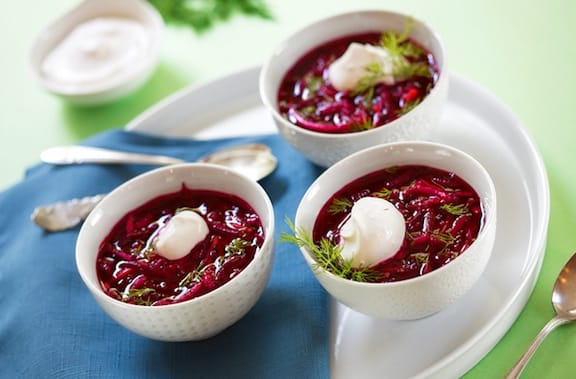
Traditional Jewish New Year Recipes and Main Dishes
- Egg-Free (Vegan) Challah
- Sweet Potato Tzimmes
- Vegan Noodle Kugel
- Seven-Vegetable Couscous
- Moroccan-Style Vegetable Stew
- Buckwheat Groats (Kasha) with Vermicelli and Fall Vegetables
- Sephardic Stewed White Beans
- Moroccan-Flavored Tofu with Apricots, Almonds, and Olives
- Two Potato Kugel
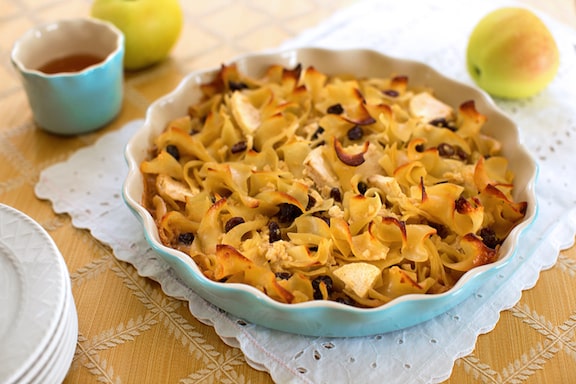
Salads
- Beet, Cucumber, and Orange Salad
- Zucchini with Mint
- Refreshingly Fruited Red Cabbage Salad
- Sweet and White Potato Salad with Mixed Greens
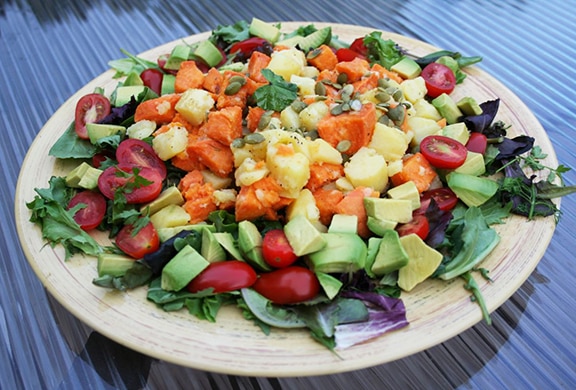
Vegetable Side Dishes
- Wine-Braised Leeks with Red Peppers and Shiitakes
- Sautéed Carrots with Dried Fruits
- Sautéed Carrots with Almonds
- Garlic-Roasted Carrots
- Summer Squash Sauté
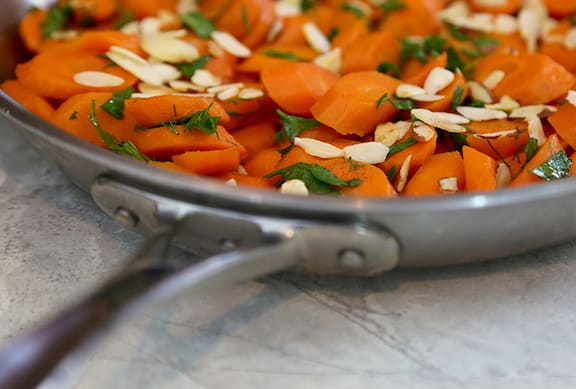
Desserts and sweets
- Just-as-Sweet-as-Honey Cake
- Rosh Hashanah Apple Ruglach
- Nutty Cashew Dates
- Vegan Apple Strudel
- Maple Baked Pears

- Here are more tips for keeping Holidays and Special Occasions healthy!
- For lots more features on healthy lifestyle, explore VegKitchen’s Healthy Vegan Kitchen page.



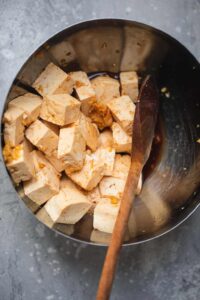


Johanna says
Great collection! Can't wait to prepare some of these!!!
Marcia says
ThankYou!!!
Marcia says
Thank you!! Fantastic ideas. The eggless challah, amazing!!
Mordechai says
Thanks for posting. Shana tova!
Nava says
Thank you; same to you, Mordechai!
Talia says
Delicious choices! Thanks, and have a wonderful new year. 🙂
Nava says
Thank you, Talia — same to you!
LL says
Sweet potatoes are not native to eastern europe. That should be clarified so as to not spread misinformation and take credit from the Indigenous peoples of the americas who were the first to use sweet potatoes as their traditional food. So much has been taken from Indigenous americans. It isn't asking much to expect people to properly credit what region their "traditional" food originated in.